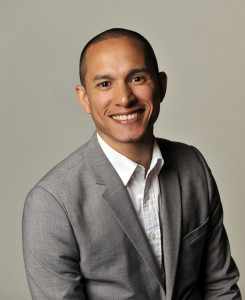We all commit little crimes all the time. We speed. We jaywalk. We drive home a little tipsy. And think back to your teenage years—did you ever shoplift?Get into a fight? Have a drink before you were of age? Do any illegal drugs?
Khalil Cumberbatch grew up in a tough neighborhood in Queens, New York. Unlike a lot of the guys he grew up with by age 19 he’d graduated high school. Then one night, out with his friends, he made a really bad decision, “I had three friends I was really close with and we committed a robbery of two women in Manhattan in November of 2002.”
Cumberbatch got caught and went to prison. “I was sentenced,” he says, “to 11 years of imprisonment.”
While he was there, Cumberbatch turned himself around. He got involved in all the educational programs, did a year of college, trained to be an HIV/AIDS educator, and became somebody that other prisoners looked up to. When he got out in 2010, he wanted to become a social worker and help people coming out of neighborhoods like his. He applied to one college—Empire State in Saratoga, NY—it’s a state school. But the application had that one little check box asking, “have you ever been convicted of a felony?”
“Not everybody who does the crime does the time. Those who do the time. There isn’t an end.”
— Emily Baxter
“Once I disclosed that I had a felony conviction,” Cumberbatch says,” I had to supply two letters of recommendation. I had to supply a letter from my parole officer. I had to supply complete criminal history report. I had to supply an essay on why I wanted to access higher education though. Even after a person supplies all of this information it’s still up to the discretion of the school and administrators to deny or accept a person.”
In the United States, somewhere between 70 and 100 million people have criminal records. That’s a quarter to a third of all adults. People of color are punished for crimes at much higher rates than white Americans. Even crimes that whites and people of color commit at the same rate. There’s also a disparity in who ends up being punished and who ends up with a criminal record. And once you’ve got that record, it just keeps going.
Emily Baxter is a public defender and says, “My clients were getting kicked out of school or losing housing or losing their professional licensure based on any one of the particular pleas that I may have helped them through in court.”
Baxter represents people against charges such as drug possession, theft, or assault. She says that even when people didn’t serve jail time — for example if they settled their case by pleading guilty to a lesser crime – they’d often end up with a record. “Not everybody who does the crime does the time,” Baxter charges. “Those who do the time, there isn’t an end.” Right now the punishment continues for all eternity and affects nearly every conceivable aspect of one’s life from personal to professional, from psychological to social. “Nobody signs up for that kind of relentless punishment.”
“During that time I was broken a little bit spiritually. I was fighting with that because I felt like wow, this is really my only option going out here and selling drugs. Doing something illegal is the only option I have, because these jobs won’t hire me because of this background.”
—Jerome Graham
Baxter says this system of “relentless punishment” felt like a systemic problem rather than a few isolated incidents in which people with criminal records were dragged down by their rap sheets.
So Baxter started working on changing policy. One thing she wanted to do was convince people not to penalize or withhold opportunities from people with criminal records and who had served their sentences. “I was speaking to landlords and licensing boards and employers,” Baxter asserts, “and the general public and anybody who might have been in a position of decision-making authority that could have influenced my clients lives. And time and time again I heard from these decision maker that you can’t trust a con or once a criminal always a criminal.”
Emily Baxter then did two things. First she started talking to people. Everybody she met, about the little crimes they had committed and got away with. She got back a wealth of stories—about the crazy, random, often dangerous crimes people do, and don’t get caught. Someone told her about stealing a fire hydrant, for example. Another woman confessed that as a teenager she’d torched a porta potty.
“If the police had pressed charges. If they had been creative. I would have had a very different life.”
—Hiring Manager who wishes to remain anonymous
She collected these confessions on a website called We Are All Criminals and juxtaposed them with stories of people who’d committed similar crimes, but were caught. When she gave presentations to cops, prosecutors government officials, whoever, she’d tell these stories, and say, ‘Hey, most of us are criminals even if we’ve never been arrested.’ Members of the audience would slowly start to accept what she was saying, because she was right, at least about some of them. “I just can’t tell you how many people have come up afterwards and said, ‘You know that story about the porta potty? Well I’ve got a story of my own.’ Or, ‘I once stole a fire hydrant too,’ which always blows my mind. Those things weigh like 200 pounds.”
Baxter interviewed one man who told her, “For several years I used meth on a daily basis if I could. If given the opportunity we would sell acid to buy more meth. I really didn’t have any concerns with the consequences or whether I’d live through the night.” That’s not his real voice.
“He did sober up,” Baxter adds. “He’s now a correctional officer and he now works with people who are going through a very similar time in their lives to what he had experienced. Now the big difference is that he was never caught so he’s in this position where he has been able to navigate both the educational system and the professional system unscathed by his past acts.”
Baxter tells stories like these alongside stories of people who have gotten caught, people like Jerome Graham, who was selling drugs in his car when police stopped him. “Back about 10 years ago,” Graham confides, “I was getting a lot of pressure to provide for my family and I got involved in some drug dealing. They charged me with felony, fleeing a peace officer in a motor vehicle, and they charged me with a felony controlled substance cocaine, fifth degree.”
Graham’s case took about eight months to work its way through the courts. In the end, the judge gave him three years probation. Not a conviction. And a way to clear his name after. But that didn’t seem to matter.
“This arrest and the multiple charges from this case,” Graham contends, “were still on my record during the time of probation and most employers viewed that as just as bad as a conviction.”
Even with his degree in psychology from a prestigious university, Graham was disqualified from job after job after job because of the background check. “During that time I was broken a little bit spiritually”, Graham confides, “and I was fighting with that because I felt like wow, this is really my only option going out here and selling drugs. Doing something illegal is the only option I have, because these jobs won’t hire me because of this background.”
It’s not just arrests and convictions that change the course of people’s lives. Sometimes even one encounter with the police can have major consequences. And as we know from so many recent events, those encounters can go down very differently for white people than they do for people of color.
Here’s another story Baxter collected. Picture in your mind this story being told by a middle-aged, white, hiring manager. As a teenager, this hiring manager and his friends imagined themselves budding film directors. They actually got together to shoot a feature film. A heist movie. “Part of the film,” the man says, “we were gonna rob a bank, and without thinking a lot about it we staged a bank robbery with replica firearms and a suitcase full of fake money with stocking masks kind of pulled down over people’s heads. And we filmed that right across the street from the bank. Four squads pulled up right in the alley from three different directions. They came at us. They had their guns out they started yelling at us, you know, ‘Drop the gun. Drop the gun.’”
The cops swarmed them. They yelled at them for a few minutes, and then, allowed them to continue filming.”
“I think about the number of kids who were playing with replica guns in the park,” the now middle aged hiring manager says, “not across the street from a bank. There could have been a real tragedy that day.”
If the hiring manger hadn’t been white, it’s easy to imagine what might have gone down that day. We just have to look at what happened in Cleveland about a year ago when police shot and killed 12-year-old Tamir Rice.
“If the police had pressed charges,” the hiring manager weighs in, “if they had been creative, I would have had a very different life. “And yet, grateful not to be shot. And it would be hard to be, a well, it would have been a long time before I could be a licensed social worker working with kids.”
“This project says that there aren’t two distinct categories of human beings,” says Baxter, ” there aren’t these two mutually exclusive boxes of clean and criminal but rather we’re all human and we’ve all violated the law and we all deserve that second chance.”
With some grit and a lot of paperwork, Jerome Graham, and Khalil Cumberbatch, who was in prison for armed robbery, have actually managed to move past their records. Graham works for a nonprofit that helps people coming out of prison, and people with records get jobs and skills. Cumberbatch is a policy advocate who sometimes find himself across the table with representatives from the mayor’s office. These two men are out there everyday talking about how the label of “criminal” has as much to do with who you are, than what you’ve done.
“There’s a lot of people that have probably done similar crimes that I’ve done, Graham says, ” or even different or worse and they’ve never been caught for ’em. So technically our society is not gonna call them a criminal. But the question is, are you only a criminal if you get caught?”
![]() PRODUCTION NOTES
PRODUCTION NOTES
Who is a criminal? was reported by Nicole Pasulka and edited by Ben Adair with sound design and production by Kaitlin Prest. Music is from Prefuse 73. Simone Seiver and Kirsten Jusewicz-Haidle provided post-production support.
SUGGESTED READING
http://www.weareallcriminals.org/
http://www.sentencingproject.org/doc/publications/rd_Race_and_Punishment.pdf
![]() This episode of Life of the Law was funded in part by grants from the Fund for Investigative Journalism, the Open Society Foundation, the Law and Society Association, the Proteus Fund and the National Science Foundation.
This episode of Life of the Law was funded in part by grants from the Fund for Investigative Journalism, the Open Society Foundation, the Law and Society Association, the Proteus Fund and the National Science Foundation.
© Copyright 2015 Life of the Law. All rights reserved.









